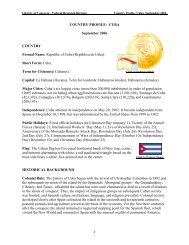1 - American Memory
1 - American Memory
1 - American Memory
You also want an ePaper? Increase the reach of your titles
YUMPU automatically turns print PDFs into web optimized ePapers that Google loves.
201<br />
workers had been out on strike for over 120 days—more than 4<br />
months; (2) only after an 80-day Taft-Hartley injunction and two<br />
voluntary extensions thereof had failed to bring settlement; (3) only<br />
after virtually every port in the Nation was shut down, since the east<br />
and gulf coasts were also struck; and (4) only after the people and<br />
economy of Hawaii had suffered grievously.<br />
It is no wonder the people of my State take small comfort in prom-<br />
ises of ad hoc congressional action, no matter how well-intentioned.<br />
We have seen time and again that Congress is very reluctant to act<br />
promptly in west coast labor-management disputes. Hawaii needs<br />
more reiiable remedies, such as S. 1566 and H.R. 7189 would afford<br />
H.R. 7189: THE SOLUTION TO HAWiUl'S DILEMMA<br />
H.R. 7189, the Hawaii and Western Islands Surface Commerce<br />
Protection Act, provides that no west coast maritime or longshore<br />
strike or lockout shall be permitt«d to interrupt normal shipping be-<br />
tween the west coast of the United States and Hawaii or the other<br />
islands in the Pacific under the <strong>American</strong> flag—Guam, <strong>American</strong><br />
Samoa and the Trust Territory of the Pacific Islands—for a period<br />
of 160 days beginning on the first day of such strike or lockout.<br />
An injunction to secure an exemption may be petitioned for in any<br />
Federal district court having jurisdiction by the Governor of Hawaii,<br />
Guam or <strong>American</strong> Samoa, the High Commissioner of the Trust Ter-<br />
ritory of the Pacific Islands, or by any employer or labor organization<br />
which is a party to the strike or lockout.<br />
An exemption injunction may not be requested if a Taft-Hartley<br />
injunction is in effect. If a Taft-Hartley injunction is obtained, the<br />
running of the exemption injunction shall be suspended until the<br />
Taft-Hartley injunction is discharged.<br />
Employees working during the exemption period will be subject to<br />
the wages, hours, and working conditions provided by their last con-<br />
tract, but will be paid retroactively for the exemption injunction<br />
period any additional wages won under the agreement resolving the<br />
dispute.<br />
For purposes of the act, an interruption of shipping services is<br />
defined as (1) a refusal at a west coast port to load or unload cargo<br />
or to permit the loading or unloading of cargo destined for or shipped<br />
from Hawaii or any U.S. Pacific Island or (2) a refusal to operate or<br />
permit the operation of a ship with cargo destined for or originating<br />
from Hawaii or any U.S. Pacific Island if any such refusal was a cause<br />
of a ship leaving the dock facility more than 48 hours late or not being<br />
unloaded more than 48 hours after arrival.<br />
CRITICISMS OF SHIPPING TIEUP EXEMPTION LEGISLATION REFTTTEn<br />
The report of the Senate Labor and Public Welfare Committee on<br />
.S. 1,566 (Senate Report 9-3-941) contained a number of criticisms of<br />
that measure which were rebutted during floor debate. Inasmuch as the<br />
same objections may be raised by opponents of H.R. 7189, the House<br />
counterpart of S. 1566. I believe it would serve a useful purpose to<br />
provide the subcommittee with a rebuttal at this time.



![Albert Einstein Papers [finding aid]. Library of Congress. [PDF ...](https://img.yumpu.com/21604228/1/190x245/albert-einstein-papers-finding-aid-library-of-congress-pdf-.jpg?quality=85)





![American Colony in Jerusalem Collection [finding aid]. Library of ...](https://img.yumpu.com/17941275/1/190x245/american-colony-in-jerusalem-collection-finding-aid-library-of-.jpg?quality=85)



![Piccard Family Papers [finding aid]. - American Memory - Library of ...](https://img.yumpu.com/17941234/1/190x245/piccard-family-papers-finding-aid-american-memory-library-of-.jpg?quality=85)


